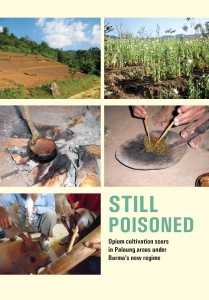Still Imprisoned: Opium Cultivation Soars in Palaung Areas Under Burma’s New Regime
By Palaung Women's Organization • October 25, 2011 Almost one year after Burma’s long-awaited elections were held in November 2010, Palaung communities in northern Shan State are suffering from the effects of an even greater upsurge in opium cultivation than in previous years. Local paramilitary leaders, some now elected into Burma’s new parliament, are being allowed to cultivate and profit from drugs in return for helping the regime suppress ethnic resistance forces in Burma’s escalating civil war. As a result, drug addiction has escalated in the Palaung area, tearing apart families and communities. Burma’s drug problems are set to worsen unless there is genuine political reform that addresses the political aspirations of Burma’s ethnic minority groups. Research carried out by Palaung Women’s Organization in Namkham Township shows that:
Almost one year after Burma’s long-awaited elections were held in November 2010, Palaung communities in northern Shan State are suffering from the effects of an even greater upsurge in opium cultivation than in previous years. Local paramilitary leaders, some now elected into Burma’s new parliament, are being allowed to cultivate and profit from drugs in return for helping the regime suppress ethnic resistance forces in Burma’s escalating civil war. As a result, drug addiction has escalated in the Palaung area, tearing apart families and communities. Burma’s drug problems are set to worsen unless there is genuine political reform that addresses the political aspirations of Burma’s ethnic minority groups. Research carried out by Palaung Women’s Organization in Namkham Township shows that:
- Opium cultivation across 15 villages in Namkham Township has increased by a staggering 78.58% within two
years. - 12 villages in the same area, which had not previously grown opium, have started to grow opium since 2009.
- A signify cant number of these villages are under the control of government paramilitary “anti-insurgency” forces, which are directly profi ting from the opium trade.
- The most prominent militia leader and drug-lord in the area, “Pansay” Kyaw Myint, from the military-backed Union Solidarity and Development Party, was elected as an MP for Namkham in November 2010; he promised voters that they could grow opium freely for 5 years if they voted for him.
- Government troops, police and militia continue to openly tax opium farmers, and to collect bribes from drug addicts in exchange for their release from custody.
- Drug addiction in Palaung communities has spiraled out of control. In one Palaung village, PWO found that 91% of
males aged 15 and over were addicted to drugs. Drug addiction is causing huge problems for families, with women
and children bearing the burden of increased poverty, crime and violence.
Download the full report here.
Tags: Drugs, Ethnic Nationalities, Opium, Palaung, Palaung Women's Organization, Shan StateThis post is in: Business and Human Rights, Drugs, Environmental and Economic Justice
Related PostsStatement of the 4th Myanmar Opium Farmers’ Forum
ကခ်င္ျပည္နယ္အရပ္ဖက္လူ႕အဖြဲ႕အစည္းျငိမ္းခ်မ္းေရးကြန္ယက္၏သေဘာထားထုတ္ျပန္ခ်က္
Statement of CSO Forum on recent deathly attacked to un-armed Community Led Anti-Drugs Campaign while eradicating opium fields
NLD’s Trip into the Murky World of the Drugs Trade
တစ္ေက်ာ့ျပန္ – မူလအေျခအေနဆိုးသို႔ ျပန္လည္ဆိုက္ေရာက္လာသည့္ ေရႊႀတိဂံေဒသ









 All posts
All posts